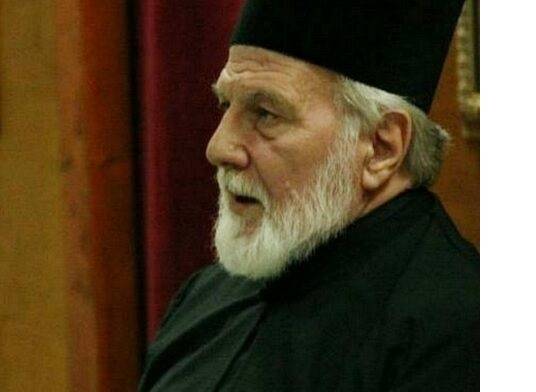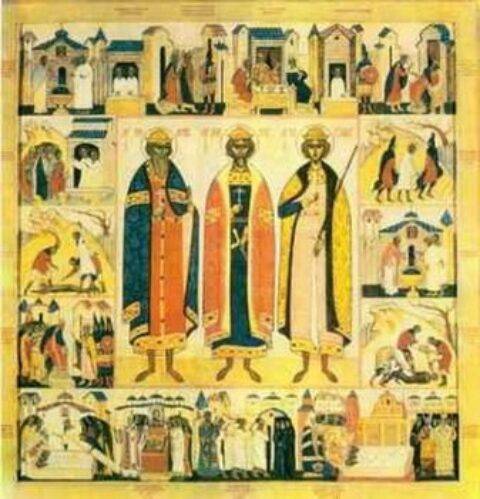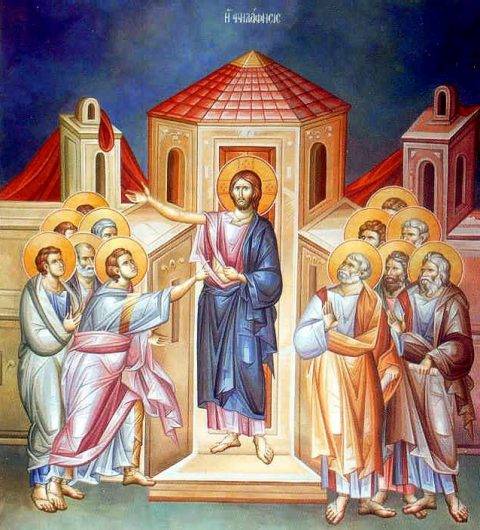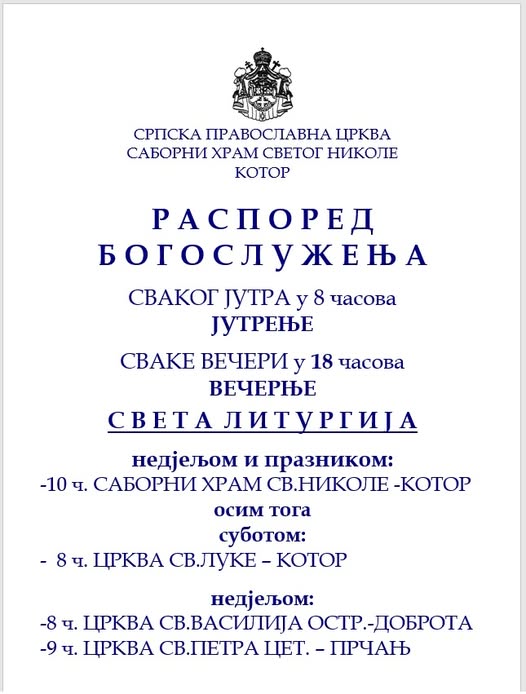.jpg)
Easter Epistle of the Serbian Orthodox Church
Serbian Orthodox Church
on EASTER 2025
PORPHYRIJE
Orthodox Archbishop of Peć, Metropolitan of Belgrade and Karlovac and Patriarch of Serbia, with all the hierarchs of the Serbian Orthodox Church – to the clergy, monasticism and all the sons and daughters of our holy Church: grace, mercy and peace from God the Father, and our Lord Jesus Christ, and the Holy Spirit, with the joyful Easter greeting:
CHRIST IS RISEN!
The event of the Resurrection of Christ, our dear spiritual children, is the central event in the entire history of the human race and the economy of our salvation. It is the basis, foundation and goal of both our faith in God and our salvation. For if the dead are not raised… our preaching is in vain and your faith is in vain, says the holy Apostle Paul (cf. 1 Cor 15:13-14). We all know that the Lord’s disciples fled and abandoned Christ when He was crucified on the cross and died. They were, in fact, waiting for a Savior who is immortal and who would also free them from death. The words of the Apostle: But we had hoped that He was the Savior of Israel (Luke 24:21) clearly confirm this. However, Christ died and rose again three days later. After the Resurrection of Christ, when He appeared alive to the Apostles and those who were with them, everyone gathered around Him again and testified that He had died and risen and that He was truly the Savior of the world. They confirmed this testimony by giving their lives for Christ. The Resurrection of Christ confirms the fact that the greatest problem of man and the entire creation is death. Death is the last, greatest enemy of creation, says the Holy Apostle Paul (1 Cor 15:26). Every man, whether aware of it or not, like all creation, carries within them death and the fear of death, but also the aspiration to overcome death and live forever. This is manifested in various ways: through eating and drinking, natural reproduction, acquiring wealth, founding a state, the development of science and technology with which we explore nature in order to find a cure for death in it, up to the negation of the other beside ourselves, even through wars and killing others, fighting for greater territory and independence from others. And yet, none of this can save man and creation from death. Moreover, this only multiplies death. And if death has the last word in history, then everything is meaningless. However, Christ rose and opened the way to resurrection for every creature. How can every person and all of nature overcome death?
Creation can overcome death and live eternally only in communion with God in Christ through the Holy Spirit. All creation, including man, since it was created from nothing, is mortal by nature and cannot overcome death and exist on its own, apart from communion with God. Therefore, at the end of creation, God created man as his image, so that through him all of creation could achieve communion with God and live eternally. This was first shown to us by Christ himself with his life. The Son of God became incarnate and became a perfect man, like us, except for sin. Christ showed with his entire life that he was bound to God the Father and that he was loyal to Him, not only as His eternal Son, but also as a man. He did not want to renounce God the Father for all the goods of this world (cf. Mt 4:8-10). Even at the cost of suffering and death on the cross, Christ did not want to renounce God the Father and love for Him, and all for the sake of love for us and His creation. Of course, Christ's death is voluntary. He voluntarily became man, took our mortal nature into His divine Person in order to free us from death, thus fulfilling the will of God the Father. Namely, in creating the world and ultimately man as a free being, God wanted the eternal life of creation to be the fruit of the union between Him and man, not only by the will of God, but also by the will and freedom of man, that is, of creation. Otherwise, if God had forcibly made us and creation eternally alive, our existence would have been imposed, and thus it would not be joy but torment.
God the Father showed immense love for His Son Christ, both as a man and in Him for all creation, by raising Him from the dead by the Holy Spirit (Acts 2:24) and making Him the Firstborn from the dead. This means that God the Father in Christ will resurrect all of us and all of nature at the end of history and free us from death. How can a person achieve communion with the Risen Christ and thus overcome death?
Based on the testimonies of the evangelists, forty days after His Resurrection, the Risen Christ met with His disciples and followers (Acts 1:3) in the Liturgy, and as the One who serves (cf. Luke 24:30-31). The Risen Christ is revealed in the Liturgy. After His Ascension into heaven, our Risen Lord Jesus Christ is still, to this day, always present at the Liturgy. However, after His Ascension into heaven, He is still present here by the Holy Spirit, but now in “another form,” i.e. in the person of the one who serves the Holy Liturgy, i.e. the bishop (or priest), who is the icon of Christ. Saint Ignatius the God-bearer confirms this when he says: Where the bishop is, there let the people be also, for where Christ is, there is also the Universal Church (Smyrnaeans 8). More precisely, the Risen Christ is present in history as a liturgical community. Hence, every person who wants to overcome death and live forever can do so by becoming a member of the Holy Liturgy through Baptism by means of the Holy Spirit. In the Liturgy, a person achieves personal communion with Christ, achieving personal communion with the bishop and with all those who are members of the Liturgy. Therefore, at every Liturgy, our dear spiritual children, and especially on this day, we celebrate the event of Christ’s Resurrection from the dead and His presence among us and foreshadow the general resurrection and final victory over death. When Christ comes again in power and glory, He will gather all nations around Him (Mark 13:26-27) in one place, and then there will be both the final judgment of the world and the realization of the Kingdom of God, of which the Holy Liturgy is an icon and manifestation now and here in history.
Since the Holy Liturgy is an icon of the future Kingdom of God and the eternal and true existence of man and nature, the first Christians organized their daily lives on the basis of liturgical experience. Their Father was God the Father, while all were brothers and sisters among themselves. Everything they had was common to them. They often gathered at the Holy Liturgy, offering bread and wine to God, and thus thanking Him for life and existence, awaiting the soonest second coming of Christ in power and glory and the general resurrection. The Orthodox liturgical experience of the future communion with God the Father in Christ, as well as with all other people and all of nature through the Holy Spirit, was followed by many in history and after the apostles and the first followers of Christ, building a civilization on liturgical foundations, i.e. a Christian civilization, of which we as a people have become and remain a part. We, dear spiritual children, should strive to live this liturgical way of life today.
However, the man of our modern civilization has based his life on himself, without Christ and without another man. Our modern civilization has defined man as a thinking individual who approaches life logically, determining his very existence on the basis of it, and therefore nothing that does not fit into human logic exists for modern man or is, at best, doubtful and useless. Hence, modern man has also become an atheist, because God and his existence cannot be understood by human logic. The man of modern civilization, understanding himself as an individual, does not need another man and communion with him in order to exist, but with his mind and mental powers determines himself as an existing person on the basis of self-awareness, i.e. thinks about himself. The saying of the philosopher: I think, therefore I am, confirms this. And when modern man achieves communion with another man, he does so not through personal and physical contact, as the Liturgy shows us, but through the Internet and social networks. Modern man sees in another man, and therefore in God as another, his enemy who limits his freedom and threatens his being. Hence, the man of modern civilization began to create mono-national states and to separate himself from others, considering others undesirable and enemies. This understanding of existence has resulted in unprecedented catastrophes and caused two world wars with enormous suffering. This continues today, as we are all witnesses. An example of this is the suffering of our people in Kosovo and Metohija at the hands of the local Albanian authorities, who expel Serbs from their centuries-old homes and daily harass those who remain, wanting to create their own state on Serbian territory sanctified by martyrs and ascetics, as well as by the multitude of Serbian Orthodox churches and monasteries. It would be better, however, for all who live in this area, but also for all people around the world, to live in peace with each other, respecting each other and helping each other in everyday life. For earthly things are a small kingdom.
We, as the church people of God, dear brothers and sisters, should oppose this individualistic way of life, living according to the example of the apostles, ascetics, martyrs, i.e. according to the example of the liturgical way of existence of the Church. This, of course, does not mean a call to return to the past and copy it. The Eucharist as an icon of the future Kingdom of God is an inexhaustible source and inspiration for ever new creations in all areas of life, starting from our daily life, family, society, and ending with science and art. In the community of freedom with Christ and other people,
Translating the church, or liturgical experience, into everyday life, we should not forget the Holy Liturgy as an event and participation in it. Living ascetic and Christian without participation in the Holy Liturgy is not enough to overcome death and live eternally. In the Liturgy, we encounter the Risen Christ Himself (Luke 24:30-31) and we unite with Him and with all people who have united with Him, as well as with all created nature, through Holy Communion. In this way, we foreshadow the future Kingdom of God, the general resurrection and the victory over death. At the same time, by serving the Liturgy and living the liturgical ethos, we will, dear brothers and sisters, best convey to the world in which we live faith in the Risen Christ and in the general resurrection as the victory of life over death. This will be our sermon on the Resurrection and eternal life, which Christ bequeathed to us, not only through words, but also through our way of life, until He comes again in power and glory and establishes the Kingdom of God.
Therefore, serving the Holy Liturgy today with special joy, with our entire people, especially with our brothers and sisters in Kosovo and Metohija, we thank the One God in the Trinity, the Father and the Son and the Holy Spirit, for all that He has done and will do for us and our eternal life, and let us greet each other, and greet all people of good will, with the joyful greeting:
CHRIST IS RISEN!
TRULY IS RISEN!
Given in the Serbian Patriarchate in Belgrade, on Easter 2025.
Your prayer books before the Risen Lord:
Archbishop of Peć, Metropolitan of Belgrade-Karlovica and Patriarch of Serbia PORPHYRIJE
Archbishop of Sarajevo and Metropolitan of Dabro-Bosnia CHRISTOM
Archbishop of Cetinje and Metropolitan of Montenegro-Lithuania JOANIKIJE
Archbishop of Sirmium and Metropolitan of Srem VASILIJE
Archbishop and Metropolitan of Banja Luka EPHREM
Archbishop and Metropolitan of Buda LUKIAN
Archbishop of Vrsac and Metropolitan of Banat NIKANOR
Archbishop of Novo Gračanica-Chicago and Metropolitan of Midwestern America LONGIN
Archbishop of Toronto and Metropolitan of Canada MITROFAN
Archbishop of Novi Sad and Metropolitan of Bačka IRINEJ
Archbishop of Stockholm and Metropolitan of Scandinavia DOSITHEJ
Archbishop and Metropolitan of Žička JUSTIN
Archbishop and Metropolitan of Vranje PAHOMIJE
Archbishop of Kragujevac and Metropolitan of Šumadija JOVAN
Archbishop of Požarevac and Metropolitan of Braničevo IGNATIJE
Archbishop and Metropolitan of Zvornik-Tuzla PHOTIJE
Archbishop and Metropolitan of Milesevo ATHANASIJE
Archbishop of Düsseldorf-Berlin and Metropolitan of Germany GRIGORIJE
Archbishop and Metropolitan of Raska-Prizren THEODOSIJE
Archbishop and Metropolitan of Kruševac DAVID
Archbishop of Romuliana-Zaječar and Metropolitan of Timočka HILARION
Archbishop and Metropolitan of Niš ARSENIJE
Archbishop of Sydney-Wellington and Metropolitan of Australia-New Zealand SILUAN
Archbishop of Zadar-Šibenik and Metropolitan of Dalmatia NIKODIM
Archbishop of Mostar-Trebinje and Metropolitan of Zahumlje-Herzegovina and Ston-Littoral DIMITRIJE
Archbishop of Los Angeles and Western America MAXIM
Archbishop of Gornja Karlovac GERASIJE
Bishop of Washington-New York and Eastern America IRINEJE
Bishop of Pakrac and Slavonia JOVAN
Bishop of Switzerland ANDREJE
Bishop of Bihać-Petrovica SERGIJE
Bishop of Buenos Aires and South-Central America KIRILO
Bishop of Osijek-Poland and Baranja HERUVIM
Bishop of Valjevo HISEHIJE
Bishop METHODIJE of Budimlje-Niksic
Bishop of Šabac JEROTHEJ
Bishop of Paris and Western Europe JUSTIN
Bishop of London and Great Britain and Ireland NEKTARIJE
Bishop retired of Zvornik-Tuzla VASILIJE
Bishop retired of Canada GEORGIJE
Bishop retired of Central Europe KONSTANTIN
Bishop retired of Slavonia SAVA
Bishop retired of Milesevo FILARET
Bishop retired of Niš JOVAN
Vicar Bishop of Remezia Stefan
Vicar Bishop of Mohacs DAMASKIN
Vicar Bishop of Marčana SAVA
Vicar Bishop of Hum JOVAN
Vicar Bishop of Hvostan ALEXEIJ
Vicar Bishop of Novo Brdo ILARION
Vicar Bishop of Lipljan DOSITHEJ
Vicar Bishop PETAR of Topli
Vicar Bishop of Jenopolja NIKON
Vicar Bishop of Moravica TIKHON
Vicar Bishop of Diocletian PAISIUS
Vicar Bishop of Kostajnica SERAPHIM
PHOTOS
RELATED ARTICLES

The show “Ask the Priest” on the occasion of the fifth anniversary of the repose of...
The show “Ask the Priest” on the occasion of the fifth anniversary...

Calendar for April 28 Holy Apostles Aristarchus, Pudus and Trophimus – Ash Monday
Saint Aristarchus, mentioned in the Acts of the Apostles (19:29) and the Holy...

Thomas Sunday
Thomas Sunday is the first Sunday after Easter. It is also called the Sunday of...


.jpg)


.png)